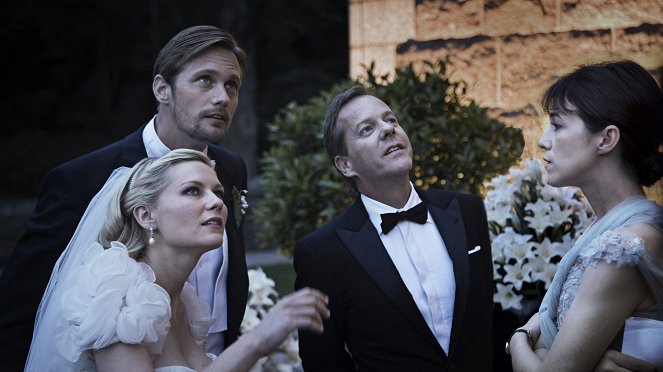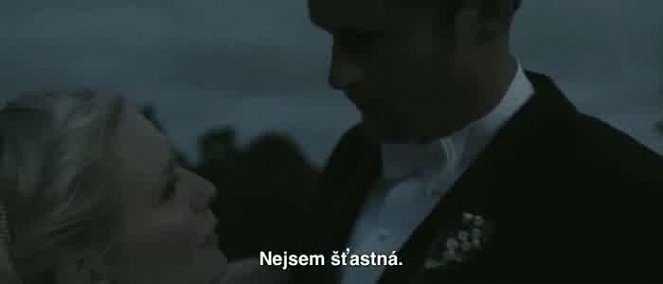Director:
Lars von TrierGuión:
Lars von TrierCámara:
Manuel Alberto ClaroReparto:
Kirsten Dunst, Charlotte Gainsbourg, Kiefer Sutherland, Charlotte Rampling, Udo Kier, Alexander Skarsgård, Stellan Skarsgård, John Hurt (más)Sinopsis(1)
Justine (Kirsten Dunst) y Michael (Alexander Skarsgard) dan una suntuosa fiesta para celebrar su boda en casa de la hermana de la novia (Charlotte Gainsbourg) y de su marido (Kiefer Sutherland). Mientras tanto, el planeta Melancholia avanza hacia la tierra... (Golem Distribución)
Videos (2)
Reseñas (9)
La primera mitad, no muy emocionante (para tres estrellas), está muy bien interpretada y deleitará con el delicado equipo internacional en papeles secundarios. Pero no brinda nada más que cualquier escena conversacional de otra película de Trier (o de Ozon). La segunda mitad de la película (para cuatro estrellas), más opresiva, más impresionante, visualmente bella y más interesante desde el punto de vista del guión, mejora la experiencia y deja la impresión final embriagada por el audiovisual artístico, pero mentalmente atónita e insatisfecha. Trier parecía estar intentando algo, como si solo estuviera encarnando un sentimiento, una idea de un verso corto. Para alguien puede ser una meditación interesante e ingeniosa (después de todo, es un juego extremadamente elegante con imágenes, música y personajes), pero para mí Melancolía sigue siendo solo un puñado de impresiones positivas, cuyo peso desaparece después de los créditos finales.
()
They should have cast Bruce Willis instead of Sutherland; only with that savior of our plant “asteroid my ass" would Trier throw an ironic grin at the audience; Jack Bauer is just too little time for something of that caliber. But seriously, now... A surreal “music video" of Wagner, Forman-style wedding and Trier in an intimate, emotional, but still visually most powerful ever end of the world. Several parts of it really manage to get across that specific atmosphere and the feelings typical for states of melancholy which you see/experience very rarely in movies.
()
There aren't many male authors who write out their feelings and then let women play it out. I consider Melancholia one of the most honest authorial statements of recent years and the opening prologue with slow motion shots and Richard Wagner's impressive music an aesthetic orgasm. What the 19th hole meant is, I don't think, very indicative (I can already see Von Trier laughing under his beard as he reads the various nonsensical explanatory theories).
()
It's not nearly as layered and symbolically connected and confusing as Antichrist. Actually, it's pretty unbalanced. The first part (Justine) is a classic raw probe into the "ceremony", in which, under the pleasing façade of luxury, hides the mud of pathological relationships and the utter emptiness of modern times (the scene in which the heroine frenetically changes the opened reproductions of modernist paintings behind the canvases of Breughel and Caravaggio, the episode with the advertising agency and the ideal slogan). The inspiration for Vinterberg and Lars' roots in Dogma 95 is more than obvious here. The whole thing is drawn to the unforeseen treacherous and dark Kirsten Dunst, who seems to be an earthly reflection of the approaching planet Melancholia - attractive, destructive, unpredictable. The second part, named after Justine's "settled" sister Claire, is a strangely monotonous wait for disaster, with Trier shifting perspective somewhat from the inside of the characters to the sky from which doom approaches. Some of the dialogues, even with hindsight, feel stretched and a little empty, but the overall vibration is powerful, with the ending being the most powerful. The strange static and passivity of the characters is actually exciting when compared to the obsessive "worldly fixers" of American movies. Justine's condemnation hovers over Melancholia like a memento: Life on Earth is evil. There's no point in looking for philosophy and message in that. Trier focused on the characters and the massively gradating wave of feeling that flounders between heaven and earth, laughter and sadness, love and hatred. Melancholia really left me with a deep melancholy. There's no point in asking why. Melancholy doesn't have a clear origin. It's like the planet. It just emerges behind the sun one day and then crashes mercilessly. It doesn't really matter how many rational complaints you can make about von Trier's new film. It is above all a pure and beautiful fetish. If you're from the same blue-green planet as Lars, of course.
()
After comedy, musical and horror, Lars von Trier ruins another genre and I bite it hook, line and sinker. The best film of the first half of 2011 and a purely emotional affair about the end of good things (not necessarily the world), pointless hopes and relationships. What captivated me the most was the evolution of the two main characters. Even though the film can be seen as a poem about the end of the world, there are couple moments that open the door for the most diverse interpretations (the 19th hole, the gangway that can’t be easily crossed, the celestial bodies that behave as if they didn’t know basic school physics). Lars von Trier is number one in the list of my favourite Nazis. That was the review, now a short spoiling interpretation to think about: In the first part of the film they say that John’s golf course has 18 holes, but in the second part we see Claire and her son at the 19th hole. This means that at least one part of the film is not real, or that it is based on reality, but it takes place in a different way than we what we can see. The key is in the conversation in the first part that stresses the fact that the course has 18 holes. That’s nonsense. 18 hole courses are standard, why would the characters explicitly point that out? They would point it out only if John’s course had a non-standard number of holes. We have therefore reason to believe that the events in first part of the film take place in a different way than we what see. We see all of them through the eyes of Justine (after whom the chapter is titled), who, facing the end of the world, transforms the apocalypse into a botched wedding in a world where the planet Melancholia is only a dot in the sky that reminds that whatever happens, things can always get worse (regardless of whether the wedding is a memory or fiction). The world in the first part of the film is a desired world without the 19th hole / without a final and unsolvable problem. So, even though Melancholia left me with a pretty unpleasant feeling right after watching it, after some time what I get is a cynical, though essentially positive message: never mind earthly worries, things will be worse when the universe starts making trouble. But it doesn’t really matter what Lars thought, anyone who willing can find something for themselves, the rest can ignore it. That’s the beauty of post-modernism. PS: Plenty of Visigoths left the cinema, lol.
()
Galería (49)
Foto © Nordisk Film Swe.



Anuncio